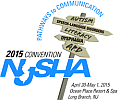SLP Graduate Students' Perceived Preparedness to Work With CLD Populations
Thursday, 11:00am to 1:00pm
Seabright
Poster 1
As the population of the U.S. continues to grow, the process of diversification lends itself to a society that is increasingly heterogeneous. An understanding of the complex interaction between language and sociocultural experiences is essential to the determination of whether a perceived language impediment is an innocuous byproduct of such processes or a true impairment. However, oftentimes the issue is not in the recognition of how important appropriate service delivery is to culturally and linguistically diverse (CLD) populations it is in the realization of such a concept in training programs and its subsequent implementation in the field. SLPs have reported a lack of resources, training, and confidence to work with CLD populations (Hammer, Detwiler, Detwiler, Blood, & Qualls, 2004; Kritikos, 2003; Roseberry-McKibbin & Eicholtz, 1994). To date, studies have not examined students' perceived preparedness to work with CLD populations; therefore, the purpose of this study is to investigate graduate SLP students' perceived preparedness to work with CLD populations. Results can help inform the development of training programs and is a valuable vantage point considering the importance placed on appropriate service delivery to CLD populations by both ASHA and the government.
Track:
Student
